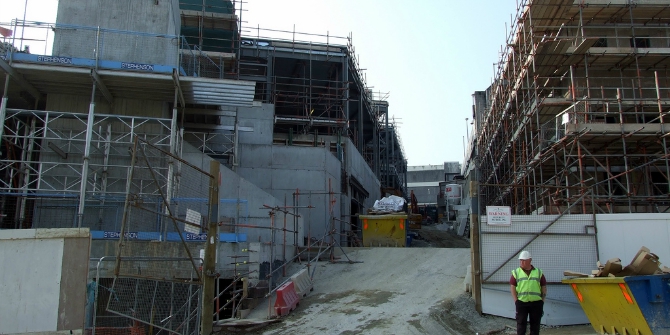 Fixing the general affordability problem requires government to do something to get house prices to fall relative to incomes, writes Henry Overman. With incomes growing slowly, this will require absolute falls in house prices unless we are willing to wait a very long time for housing affordability to improve. Falls in house prices (absolute or relative) will require increased supply.
Fixing the general affordability problem requires government to do something to get house prices to fall relative to incomes, writes Henry Overman. With incomes growing slowly, this will require absolute falls in house prices unless we are willing to wait a very long time for housing affordability to improve. Falls in house prices (absolute or relative) will require increased supply.
Here’s a round up of three efforts from the middle of last year. I was reminded of this by Harriet Harman on the Today Programme yesterday morning. Talking about improving housing affordability she was asked if she would like to see housing prices fall. This is, of course, a tricky question for a British politician – and she dodged it by saying that house price falls would be bad but that Labour were committed to increasing supply and improving affordability.
Unfortunately, this really doesn’t make any sense. ‘Affordability’ is essentially determined by the price of housing relative to incomes and the availability and cost of mortgage finance. As we know, availability is an issue for some buyers at present. Fixing this would improve the situation for those buyers but, in the absence of any increase supply, would raise prices overall. This is the central problem with the government’s help-to-buy scheme. The cost of finance is at a historic low and you would put your money on that cost increasing rather than decreasing in the medium to long run. We would, of course, all like incomes to rise but general increases in income will also raise prices overall in the absence of a supply response. Fixing affordability requires housing poor families to see their incomes rising faster than housing rich families. Desirable, perhaps, but I’d like to know how that’s going to be achieved in practice.
In short, fixing the general affordability problem requires government to do something to get house prices to fall relative to incomes. With incomes growing slowly, this will require absolute falls in house prices unless we are willing to wait a very long time for housing affordability to improve. Falls in house prices (absolute or relative) will require increased supply. This, in turn, is a key component of Labour’s housing policy (they are pledging to build 200,000 more houses annually). Setting aside whether that policy will be effective in increasing supply – something for another day – to be effective in improving affordability it will have to lead to falls in house prices. The Coalition is trying to achieve exactly the same thing through some of it’s planning reforms.
Of course, it would be a brave politician who acknowledged that they want to increase supply sufficiently to see prices fall – because existing owner occupiers stand to lose if prices fall. In turn, this is the reason why home owners tend to oppose new building which constrains supply and causes affordability problems. There are no easy answers to this policy dilemma, but unfortunately denying that it exists is unlikely to get us very far in solving the housing crisis.
This article was originally published on the SERC blog.
Note: This article gives the views of the author, and not the position of the British Politics and Policy blog, nor of the London School of Economics. Please read our comments policy before posting.
Henry Overman is professor of economic geography at LSE and director of the What Works Centre for Local Economic Growth. He is writing here in a personal capacity.







